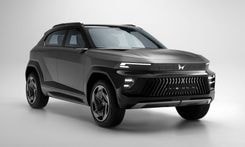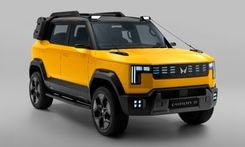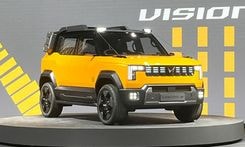Independence Day 2022: Made In India, Made For India Cars By Global Automakers
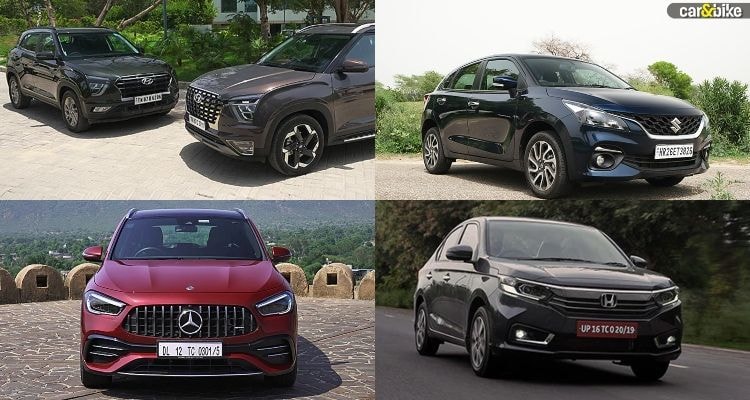
- Suzuki has been at the forefront of transforming India's passenger car segment
- The Volkswagen Group has found a new footing with the India 2.0 strategy
- Hyundai remains India's biggest auto exporter with products made and developed here
It's the 75th year of Indian independence and a reminder of what we stand for - unity, diversity, prosperity, and progress - the last seven and a half decades have seen it all. As the world keeps changing and evolving, our nation continues to be at the forefront of this transformation, driving the growth from all corners. In the automotive space too, India is one of the leading markets in the world, fourth largest globally, and global automakers have worked hard to find their foothold in what is traditionally a challenging yet rewarding market. This meant that carmakers really had to push through and put their thinking caps on pushing boundaries of innovation and technology to meet the tastes of the Indian customer. Today, the Indian automobile sector isn't just about addressing the consumer needs of the country but about producing world-class products that meet global standards and are exported to developed markets. On this 75th Independence Day, let's take a look at the automakers who follow the Made In India, Made For India product strategy.
Also Read: Independence Day 2022: Top 5 Highest Car Exporters From India
Suzuki played a transformative role in changing the Indian auto sector and India is the Japanese automaker's biggest market by volumes globally
1. Suzuki
Undoubtedly one of the most recognisable automakers in India and the world, Suzuki arrived in the country in 1981 joining hands with Maruti Udyog Limited founded by the Indian government. The Japanese auto giant went on to change the face of the Indian automobile industry has it eclipsed every major automaker in sight over the last four decades. Maruti Suzuki has been ruling the passenger car segment and currently holds a 44 per cent market share with Suzuki Corporation playing a significant role in the kind of products that come to India or are developed for the market here. In fact, Suzuki established its independent plant in Gujarat in 2017 that produces cars not just for India but a number of markets overseas. This includes the new-generation Baleno, Swift and Dzire. Maruti Suzuki's Manesar facilities also make and exports cars globally.
Hyundai's strategy has not only been about bringing its global products to the country but also Indianising the same to meet local customer needs
2. Hyundai
India's second most-selling automaker, Hyundai Motor India arrived in the country in 1998 and has one of the widest range of offerings on sale. Having begun its journey with the humble Santro, the automaker's latest launch is the Tucson SUV, it's new flagship offering. The South Korean carmaker has always kept India at the forefront, right from product development to launches. The company developed models specifically for the Indian market over the years, in line with its global ambitions, which has helped Hyundai achieve massive volumes. Products like the Grand i10, i20, new-generation Santro, Creta and Alcazar, among others, have all been Indianised and exported from the brand's Irrungattukottai facility in Tamil Nadu. In fact, Hyundai is the largest automotive exporter in the country, which should speak volumes about how important India is to its global strategy.
VW's India 2.0 strategy spawned the MQB A0 IN platform that's making way for Indianised models that are being sold globally
3. Volkswagen Group
The Volkswagen Group as a whole has had India on its radar for a while now. While the company may have stumbled a few times through its journey, the German automaker seems to be finding its footing -- stronger than ever -- with the India 2.0 strategy. The MQB A0 IN platform was specifically developed for the country, Indianising its famed MQB modular architecture, which has spawned models like the Skoda Kushaq and Slavia and VW Taigun and Virtus so far. All of the offerings are also being exported from India to several countries. The automaker further plans to introduce more products that meet global standards and its India operations will be playing a dominant role in the same. In fact, India has a larger role to play in the VW Group operations with brands like Audi, Porsche and Lamborghini also witnessing strong growth in India. While Audi locally assembles some models here and has been pushing the envelope in the EV space, Lamborghini remains one of the fastest growing super luxury car brands and recently delivered its 400th car in the country.
Also Read: Independence Day 2022: How To Purchase A Used Army Non-Combat Vehicle From Defence Auctions In India
Renault and Nissan have found major footing with products like the Kwid and Magnite respectively, with the models driving the growth for exports too
4. Renault-Nissan
The Renault-Nissan alliance has been one of the big investors in India's automotive sector and the company worked tirelessly to spend the big bucks on making products and technologies specific to the consumers here. In fact, the CMF-A platform was specifically developed for markets like India and it went on to spawn offerings like the Renault Kwid and the erstwhile Datsun range. The more modern derivative of this platform brought offerings like the Renault Triber and Kiger as well as the Nissan Magnite. The latter was a groundbreaking offering for Nissan India, bringing some much-needed volumes to the automaker, while also meeting global standards on safety and technology. The Renault-Nissan alliance plant in Oragadam also happens to be one of the biggest exporters of cars from India. It exported over one million units in 2020 and that number has only grown since.
Mercedes-Benz was one of the earliest luxury players to set shop in India and the first mover advantage has given the brand a strong foothold in the segment
5. Mercedes-Benz
When talking about the luxury segment, Mercedes-Benz holds the key to the hearts of the Indian masses. The brand is instantly recognisable and remains aspirational in every way. It's also a brand that recognised India's potential early, making its entry into the market as early as 1994. The German luxury carmaker has actively worked on bringing its global products to India ever since and has been quick on introducing the models soon after the global launch. The automaker has invested about Rs. 2,000 crore in its operations in India, the highest among the luxury players, which has been put into building an assembly line and localising the offerings. Mercedes' parent Daimler AG also dabbles in the commercial vehicle segment with the BharatBenz brand has significantly higher investments and builds trucks and buses for the domestic and export market. To be fair, BMW too assembles its models in India and has been a formidable challenger to its German counterpart for introducing and assembling global products in India.
Also Read: Independence Day 2022: Major Indian Auto Brands With Global Reach
Toyota's famed reliability is common in India as it is globally and the carmaker plans to take it up a notch by making accessible strong hybrids at its Bidadi plant
6. Toyota
Toyota Kirloskar Motor was an early investor in the Indian automotive dream and it was in 1997 that the country got the taste of the Japanese carmaker's legendary reliability. With models like the Qualis and Corolla, Toyota established its name and reputation in the country, only to be cemented by products like the Innova, Camry, Etios twins, Fortuner, among others. The carmaker's Bidadi plant has been a production hub making cars for India and the world. Toyota India also found avenues in its partnership with Suzuki, bringing rebadged models to the world. However, it will scale up aggressively now as the company will produce models like the Toyota Hyryder and the Maruti Suzuki Grand Vitara at its Bidadi facility. Not just that, Toyota India also announced earlier this year that it plans on producing electric powertrain parts used by different electric vehicles, which will help shape the country's EV sector.
Also Read: Independence Day 2022: Safest Mass Market Cars In India
With products like the City and Amaze, Honda has managed to offer masses products that appeal to their sensibilities while also remaining global in what they are
7. Honda
Another Japanese carmaker that capitalised on India's potential early on, Honda Cars India established itself in 1995 in partnership with Usha International, before turning into a 100 per cent subsidiary of Honda Japan in 2012. The company began its innings in the country with products like the Honda City, a model that continues to be a cash cow for the automaker and a benchmark in the segment. It recently introduced the fifth generation City Hybrid, showing that the brand was ready to make bold moves. The carmaker will further amp up its product quotient with new SUVs planned to join the lineup soon that will be made in India but sold globally too.
Latest News
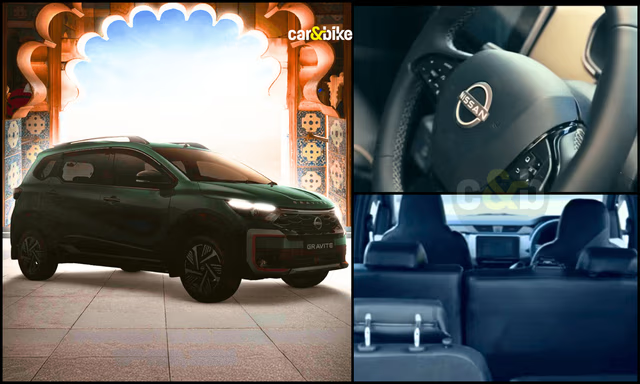 Jafar Rizvi | Feb 7, 2026Nissan Gravite Interior Spotted Ahead Of February 17 DebutThe Gravite’s interior appears to carry over the familiar layout from the pre-facelift Renault Triber, with only minor updates expected.2 mins read
Jafar Rizvi | Feb 7, 2026Nissan Gravite Interior Spotted Ahead Of February 17 DebutThe Gravite’s interior appears to carry over the familiar layout from the pre-facelift Renault Triber, with only minor updates expected.2 mins read car&bike Team | Feb 7, 2026Jawa 730 Twin UnveiledJawa Moto has introduced the 730 Twin, the fourth model in its lineup to be based on the 750 platform.2 mins read
car&bike Team | Feb 7, 2026Jawa 730 Twin UnveiledJawa Moto has introduced the 730 Twin, the fourth model in its lineup to be based on the 750 platform.2 mins read car&bike Team | Feb 6, 2026Indian Motorcycle Parts Ways With PolarisAs America’s first motorcycle brand prepares to celebrate its 125th anniversary, Indian Motorcycle has parted ways with former parent Polaris to become an independent company.1 min read
car&bike Team | Feb 6, 2026Indian Motorcycle Parts Ways With PolarisAs America’s first motorcycle brand prepares to celebrate its 125th anniversary, Indian Motorcycle has parted ways with former parent Polaris to become an independent company.1 min read car&bike Team | Feb 6, 2026BMW F 450 GS Based Sportbike Spotted On TestThe upcoming supersport machine is expected share the same parallel-twin engine with the upcoming BMW F 450 GS.1 min read
car&bike Team | Feb 6, 2026BMW F 450 GS Based Sportbike Spotted On TestThe upcoming supersport machine is expected share the same parallel-twin engine with the upcoming BMW F 450 GS.1 min read car&bike Team | Feb 6, 2026Tata Sierra Bookings Cross 1 Lakh Mark; Production Ramped UpWith bookings now in six-digit territory, Tata Motors is moving ahead with a phased ramp-up in production, while working through supplier-related constraints.1 min read
car&bike Team | Feb 6, 2026Tata Sierra Bookings Cross 1 Lakh Mark; Production Ramped UpWith bookings now in six-digit territory, Tata Motors is moving ahead with a phased ramp-up in production, while working through supplier-related constraints.1 min read car&bike Team | Feb 6, 2026Mahindra To Set Up Its Biggest Automobile Plant In Nagpur; Production To Begin In 2028The new facility will support next-generation platforms from the brand and will be capable of manufacturing multiple powertrains including ICE, EV & future technologies1 min read
car&bike Team | Feb 6, 2026Mahindra To Set Up Its Biggest Automobile Plant In Nagpur; Production To Begin In 2028The new facility will support next-generation platforms from the brand and will be capable of manufacturing multiple powertrains including ICE, EV & future technologies1 min read
 Bilal Firfiray | Feb 4, 2026Volkswagen Tayron R-Line Review: Sensible Flagship For IndiaVolkswagen has introduced a made-in-India flagship SUV that offers space, comfort, performance, and German driving finesse in a practical three-row package. But is the Tayron R-Line good enough?6 mins read
Bilal Firfiray | Feb 4, 2026Volkswagen Tayron R-Line Review: Sensible Flagship For IndiaVolkswagen has introduced a made-in-India flagship SUV that offers space, comfort, performance, and German driving finesse in a practical three-row package. But is the Tayron R-Line good enough?6 mins read Preetam Bora | Feb 2, 2026TVS NTorq 150 Road Test Review: Bigger, Better & More Efficient!We test the new TVS NTorq 150 out in the real world to get a sense of what it offers in terms of performance, dynamics and fuel economy.7 mins read
Preetam Bora | Feb 2, 2026TVS NTorq 150 Road Test Review: Bigger, Better & More Efficient!We test the new TVS NTorq 150 out in the real world to get a sense of what it offers in terms of performance, dynamics and fuel economy.7 mins read Bilal Firfiray | Jan 21, 2026Tata Punch Facelift Review: New Turbo Engine; Same Old SoulWith the update, the Tata Punch facelift retains its character of being a healthy runabout, which is perfect for Indian roads. But have these changes made it any better?7 mins read
Bilal Firfiray | Jan 21, 2026Tata Punch Facelift Review: New Turbo Engine; Same Old SoulWith the update, the Tata Punch facelift retains its character of being a healthy runabout, which is perfect for Indian roads. But have these changes made it any better?7 mins read Amaan Ahmed | Jan 17, 2026Bajaj Chetak C25 First Ride Review: Basic, Likeable E-Scooter For First-Time RidersThe Chetak C25, in quite a few ways, is poles apart from the larger and more powerful 30 and 35 Series models, but in its mannerisms, it is very much a Chetak.8 mins read
Amaan Ahmed | Jan 17, 2026Bajaj Chetak C25 First Ride Review: Basic, Likeable E-Scooter For First-Time RidersThe Chetak C25, in quite a few ways, is poles apart from the larger and more powerful 30 and 35 Series models, but in its mannerisms, it is very much a Chetak.8 mins read Bilal Firfiray | Jan 9, 2026Toyota Urban Cruiser Hyryder: 10,000 km Long-Term ReviewAfter spending over three months and 10,000 km with the Toyota Urban Cruiser Hyryder Hybrid, we were impressed by its real-world mileage, seamless hybrid, practical comfort, and Toyota reliability. Is it the best C-SUV then?5 mins read
Bilal Firfiray | Jan 9, 2026Toyota Urban Cruiser Hyryder: 10,000 km Long-Term ReviewAfter spending over three months and 10,000 km with the Toyota Urban Cruiser Hyryder Hybrid, we were impressed by its real-world mileage, seamless hybrid, practical comfort, and Toyota reliability. Is it the best C-SUV then?5 mins read
